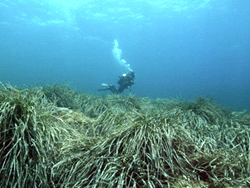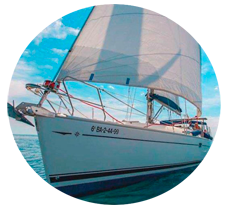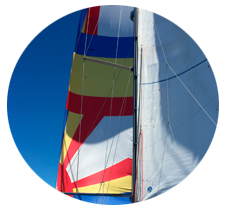Cetaceans of the Mediterranean Sea
It is often believed that there are no dolphins or whales in the Mediterranean Sea. Nevertheless they often visit us while we navigate, they accompany us, give us joy and happiness during most part of our trips.
For as much as we admire them and are thankful for their presence we strive to be respectful of them and their environment by not throwing anything at sea which could be harmful: chewing gum, cigarette butts, plastics, used oils, etc. disappear rapidly from our sight as we throw them overboard….but the consequences can be disastrous for others.
Help us to keep up high the pleasure we feel when seeing these friendly fins coming close to our prow, we also want to share this with you. If you want to sight dolphins from a sailboat come to SON A MAR.
Recycling on board – Residues
Recycling on board
Even in a small space, as is a boat, recycling is possible. On board we are all very conscious of the importance of classifying rubbish and at the same time saving bilge space that would be better used for food, tools and clothing. We organize every tiny hole and gap to separate glass, paper and plastic. Thus avoiding the accumulation of garbage bags we don’t know where to keep during long crossings far from ports and also eliminating bad smells on board.
Residues
Before throwing rubbish out at sea it is convenient to bear in mind the impact it causes and how long it takes for the disintegration/decomposition of various materials:
- Glass (sink): indefinite time.
- Tampons, sanitary towels, plastic cans and bottles (float): 450 years.
- Tins and cans (sink): 200 years.
- Tetrabriks (sink): 100 years.
- Plastic bags and glasses (sink): 50 years.
- Wood (float): 13 years.
- Newspaper (sink): 8 months.
- Cardboard and carton (sink): 2 months.
Our impact
If you compose your kit with natural and biodegradable shampoos and gels, the sea will thank you, we want to avoid the great impact of micro-plastics and unnecessary contamination.
The oceanic Posidonia
What is Posidonia Oceanica and why do we avoid casting the anchor on it?
Posidonia oceanica, commonly known as Neptune grass or Mediterranean tapeweed, is an angiosperm plant (not an algae) adapted to live under water. It is a vital element to preserve the Mediterranean’s ecosystems, prevent coastal erosion and also balance the presence of CO2 in the sea and atmosphere.
The main threats of posidonia ecosystems are marine constructions, contamination of coastal waters, making artificial beaches, global heating of ocean waters due to climate changes, removal of dead leaves on beaches and boat anchorage.
Due to its very slow regenerative process posidonia determines non renewable resources/ecosystems. At this moment Posidonia oceanic meadows are disappearing from all the Mediterranean Sea.
 The meadow function, comparable to that of a forest, is essential for the ecological balance of marine resources. It depurates and oxygenates coastal waters, giving them quality and transparency. It also shelters many species of fish and invertebrates.
The meadow function, comparable to that of a forest, is essential for the ecological balance of marine resources. It depurates and oxygenates coastal waters, giving them quality and transparency. It also shelters many species of fish and invertebrates.
Posidonia meadows also play a fundamental role in the conservation and protection of beaches and sand dunes, both very fragile and of great ecological value, forming marine reefs parallel to the coast as high as 1’5 to 2 meters high, thus creating a natural barrier which diminishes the action of breaking waves. Furthermore, dead Posidonia leaves on the beach also form barriers against erosion caused by winter storms. Between storms these dead leaves become buried under new coming sand, thus consolidating the beach.
These ecosystems which occupy approximately half a million square meters are now in global regression, with a yearly estimated loss of 1 to 2%, four times superior to tropical forest losses. In the Mediterranean the percentage goes up to as much as 5%. What is worse is that due to this plant’s slow growth (2cm/year) and its scarce production of seeds makes the process irreversible since the recuperation of a meadow requires various centuries.
The importance of Posidonia Oceanica meadows is well known and is included in the European Union Directive Council as a prioritary protected habitat. The meadows in Ibiza (Eivissa) and Formentera were declared in 1999 as Patrimony of Humanity by UNESCO.
More information here:
http://marenostrum.org/vidamarina/vegetalia/fanerogamas/posidonia/

Posidonia meadows also play a fundamental role in the conservation and protection of beaches and sand dunes, both very fragile and of great ecological value, forming marine reefs parallel to the coast as high as 1’5 to 2 meters high, thus creating a natural barrier which diminishes the action of breaking waves. Furthermore, dead Posidonia leaves on the beach also form barriers against erosion caused by winter storms. Between storms these dead leaves become buried under new coming sand, thus consolidating the beach.
These ecosystems which occupy approximately half a million square meters are now in global regression, with a yearly estimated loss of 1 to 2%, four times superior to tropical forest losses. In the Mediterranean the percentage goes up to as much as 5%. What is worse is that due to this plant’s slow growth (2cm/year) and its scarce production of seeds makes the process irreversible since the recuperation of a meadow requires various centuries.
The importance of Posidonia Oceanica meadows is well known and is included in the European Union Directive Council as a prioritary protected habitat. The meadows in Ibiza (Eivissa) and Formentera were declared in 1999 as Patrimony of Humanity by UNESCO.
More information here:
http://marenostrum.org/vidamarina/vegetalia/fanerogamas/posidonia/








